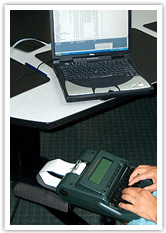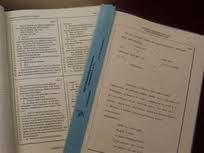 What is the difference between a job and a profession? A job typically requires minimal experience and education. All that is needed is a minimum amount of skills to get the job done. A profession requires a high level of knowledge and skills. Individuals in professions are not easily replaceable since their education, extensive training, and skills make them unique assets. As a result, professions generally have higher levels of compensation.
What is the difference between a job and a profession? A job typically requires minimal experience and education. All that is needed is a minimum amount of skills to get the job done. A profession requires a high level of knowledge and skills. Individuals in professions are not easily replaceable since their education, extensive training, and skills make them unique assets. As a result, professions generally have higher levels of compensation.
High Skill Levels
Court reporters must graduate from an accredited court reporting program at the writing speed of 225 words per minute. Court reporting students learn a writing theory called “stenographic shorthand”, which they must know how to read and write on their stenographic machines. Stenographic machines enable reporters to write at a faster rate through condensing words to phonetic syllables. This method is much faster than typing on a QWERTY keyboard. The language of court reporting is complicated, and students must become proficient at this unique skill.
Reporters typically spend several hours writing the verbatim testimony of witnesses. However, work doesn’t end when they leave the office. Reporters then return to their home or office to edit, research and proof for several more hours. A good rule of thumb is if the writing of the testimony took an hour, it will take two to three hours to edit, research, proof and produce into a transcript that hour of testimony. Because a reporter’s job is centered around writing, transcribing, and editing, excellent verbal skills are required. It is imperative that reporters are well-read and educated so that transcripts are accurate and coherent. Reporters should always be in pursuit of enhancing their verbal and word recognition skills.
Professional Association Participation
Reporters typically belong to various court reporting associations such as the National Court Reporter’s Association (NCRA) or state-specific organizations such as the Michigan Association of Professional Court Reporters (MAPCR). These organizations provide great opportunities to network with other agencies and reporters. They also hold conferences where they meet and educate reporters on current trends, issues, or new technology. For example, the NCRA holds major conferences in different states each year. Reporters can attend special speaking engagements or even be the first individuals to experience new reporting technology.
The NCRA is also responsible for national court reporting certifications. Although being a member means you must pay an annual fee, being certified puts you at an advantage. It communicates to attorneys and agencies that you are a qualified and competent reporter because you have to pass written and practical tests with each certification that proves you are at the certified level. Being certified leads to better opportunities and levels of compensation.
A Diverse and Enriching Profession
People often misconceive that reporters are merely individuals who take down the record, go home, print out the transcript, and that’s the extent of their occupation. But there is far more to the profession than what they often realize. Not only does reporting involve extensive education and training, but a reporter’s education extends beyond school. A wise reporter never stops learning and enhancing their skills, often doing research and extra reading on various topics in order to broaden their scope of understanding of the world around them. Reporters often attend conventions, conferences, and become certified for the sake of building their career. For these many reasons, court reporting is a profession and not just a job. Court reporting is far more diverse and enriching than what a typical job can offer.
If you found this article interesting, you might also be interested in “The Top 10 Skills of the Best Legal Assistants.”
 Learning about reporting is far different than actually working as a reporter. Students often worry about whether or not they’ll be able to handle a court reporting career, but there are steps you can take to avoid being unprepared for the life of a working court reporter.
Learning about reporting is far different than actually working as a reporter. Students often worry about whether or not they’ll be able to handle a court reporting career, but there are steps you can take to avoid being unprepared for the life of a working court reporter. For years, people have been warning court reporters and students that the future of court reporting is doomed. But contrary to the warnings, the industry has not collapsed. It is alive and well, even thriving due to advancements that have strengthened the profession.
For years, people have been warning court reporters and students that the future of court reporting is doomed. But contrary to the warnings, the industry has not collapsed. It is alive and well, even thriving due to advancements that have strengthened the profession. Is it okay for me to get a free copy of a transcript from opposing counsel?
Is it okay for me to get a free copy of a transcript from opposing counsel?
 Recently, there has been an increase in the number of gift-giving or reward programs offered to attorneys and their staff for scheduling depositions with a particular court reporting agency. The gifts clearly are made in order to influence the selection of court reporting agencies when scheduling depositions. There is an ongoing debate among court reporters whether this practice is ethical and whether it begins to erode the industries’ reputation for operating with high integrity.
Recently, there has been an increase in the number of gift-giving or reward programs offered to attorneys and their staff for scheduling depositions with a particular court reporting agency. The gifts clearly are made in order to influence the selection of court reporting agencies when scheduling depositions. There is an ongoing debate among court reporters whether this practice is ethical and whether it begins to erode the industries’ reputation for operating with high integrity.